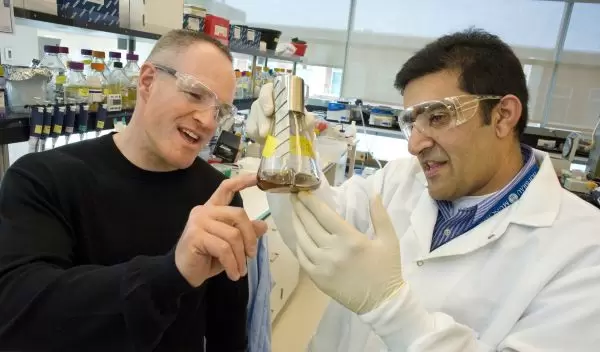
Microbe Metabolism Harnessed to Produce Fuel
Microbes such as the yeast we commonly use in baking bread and fermenting beer are now being engineered to produce the next generation of biofuels. Jay Keasling, a professor of chemical engineering at the University of California, Berkeley, is leading a team of scientists in an effort to manipulate the chemistry within bacteria so they will produce fuel from sugar.
At the Joint BioEnergy Institute (JBEI), one of three research centers set up by the Department of Energy for the research and development of biofuels, Keasling is utilizing synthetic biology techniques involving chemistry, genetic engineering and molecular biology. Foundational work being done at the Synthetic Biology Engineering Research Center (SynBERC), where Keasling is director, will underpin the research at JBEI. SynBERC is funded by the National Science Foundation (NSF).
"For the most part, genetic engineering is done by taking components, like genes, from nature and using them," Keasling said. "But nature designed them for a different purpose, so the point of synthetic biology is to have well-characterized components that we can easily assemble to engineer biology and do genetic manipulation in a much easier way."
The science
Unlike ethanol, which is produced largely from grains, these biofuels would be developed from plant cell walls (lignocellulose), an abundant, and as yet untapped, resource. Energy from the sun is stored by plants in long polymers of sugar such as cellulose, hemicellulose and lignin, which make up the plant cell walls. Before they can be fermented into fuel, these sugars need to be broken down into simpler sugars, something that can be done using natural enzymes found in microbes.
JBEI's Deconstruction Division is developing new enzymes to break down the plant biomass into fermentable sugars. Once deconstructed into sugars, Keasling's Fuels Synthesis Division takes over and engineers the chemistry within microbes so that they will take in sugar and convert it into fuel.
"Most of the biofuels industry in the past has focused on ethanol," Keasling said. "Our twist on this is we're creating biofuels that behave exactly like petroleum-based fuels. It can be piped and used as a diesel fuel or jet fuel replacement, which ethanol cannot."
More affordable anti-malarial drug
Keasling has already shown success with synthetic biology technology. In collaboration with private-sector partners, one of them co-founded by Keasling, he and his research team at UC Berkeley engineered the metabolism of E.coli to produce artemisinic acid, a precursor to the anti-malarial drug artemisinin.
Artemisinin is a compound derived from the sweet wormwood plant. Combination therapies that include artemisinin are effective and safe for patients in the treatment of malaria. However, because extraction of the drug from sweet wormwood is slow, labor-intensive and expensive, people affected with malaria--the majority being children in sub-Saharan Africa--cannot afford it. The process developed by Keasling makes it significantly cheaper and will improve access to anti-malarial treatments.
Research at UC Berkeley began in December 2004 and was completed in December 2007. The renewable products company Keasling helped create then optimized the microbe and the fermentation process to grow the microbe, and now a major pharmaceutical company is scaling it up so that semisynthetic artemisinin can be manufactured for commercial markets.
"Within a year or two years, there should be drug and anti-malarial therapies that are derived from our process," Keasling said. "Our whole goal is to make these anti-malarial drugs more available and cheaper so that everyone can get them."
Looking to the future
The future for synthetic biology is tremendously bright. "What we have to do is make it easier to engineer this kind of technology: getting people to work together, building parts and sharing parts of DNA that are well-characterized and can be easily assembled into large functioning systems," Keasling said. "Imagine a future where we're engineering microbes to make all of our drugs and chemicals."
While many new developments using synthetic biology technology are on the horizon (scientists at MIT are even genetically modifying a virus to construct parts of batteries, for example), for now, development of biofuels may be the most pressing undertaking. And, according to Keasling, we are within three to five years of seeing them materialize.
"The U.S. uses a tremendous amount of fuel, and sourcing this from plants--rather than petroleum--is an enormous undertaking, given how much fuel we burn every year," Keasling said. "If we produce fuels from biomass grown in the U.S., we're going to have carbon neutral fuels and a more secure energy future; we won't have to depend on foreign countries."
-- Irene Chang, National Science Foundation ichang06@gmail.com
This Behind the Scenes article was provided to LiveScience in partnership with the National Science Foundation.


